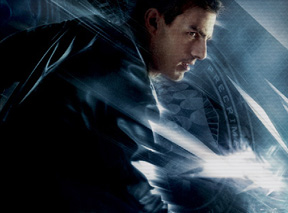Minority Report - Spielberg's darkest speculative opus  | | ©2002 Dreamworks Pictures | | | | | Phillip K. Dick and Stephen Spielberg didn't strike me as an obvious pairing of personalities when I first heard of the Minority Report film. I love Dick's writing. Its intellectually thick, it's dark, it's very inventive and unlike a lot of science fiction writers it has soul like Marvin Gaye or Otis Redding. Spielberg is certainly brilliant. His films are also inventive, often brainy and always very well done. But do they have soul? Not really. They have heart, but not a lot of soul &endash; the kinda soul that has its roots in the blues, but comes out victorious and tragic all at once. Soul comes from finally making it to the top after a lifetime of losing. Dick knew all about the bitter and the sweet in life, having suffered poverty, drug addiction and madness he struggled and fought with his own demons and those that the world threw at him. The legacy he forged was that of a whole, deep soulful life reflected in the words he left behind. Spielberg, I am sure has had his share of suffering and loss. Who doesn't? But his knowledge of the bitterness of life very rarely comes through in his films. The few times it has (as in Schindler's List), have been his greatest achievements. So it took me some time to warm up to the idea of these two creators collaborating. When I heard that Spielberg turned down the Harry Potter movie to work on Minority Report, I was encouraged just enough to give it a chance. But that was all. Even so, I was surprised at how superb and fascinating the film was. For those of you who don't know already, Minority Report tells the tale of Officer John Anderton, a D.C. cop put in charge of something called "The Precrime Division." Somehow, in this future, humanity has found a way of creating humans who can see the future, like true oracles. Three of these "precogs" are used by the Precrime Division to see murders before they happen. The visions are recorded and displayed played back for two witnesses and Anderton to quickly interpret and garner clues from before the murder happens. Once they have the names of attacker and victim and a location, Anderton and his team of officers rush out to prevent the murder. The assailant is then arrested &endash; even if he has not yet attempted the crime &endash; and immediately put in a suspended animation "jail" for an unmentioned amount of time. So far the story is ripe with all sorts of ethical and legal implications. These manifest themselves when the precogs predict that Anderton will murder a man he's never met. He of course flees the authority of his fellow officers and proceeds to play out the prophecy by trying to clear his name. The story, despite some very minor flaws (such as why Anderton didn't just leave town and hide from any human contact until the predicted moment of his crime had passed), was fascinating and well written. Tom Cruise, did a very competent, but not stunning job as Anderton. If that sounds like sour grapes on my part, its only because I have been expecting a lot from him since seeing Vanilla Skies and Magnolia. In Minority Report, he was exactly what the script demanded - troubled, dedicated to his work, action packed when he has to run from it and compassionate when he is put in the shoes of those he had arrested. But any decent actor could have done that. Visually this movie is like nothing else he has ever done. It looked gritty &endash; maybe a bit in the fashion of Schindler's List, but had a frenetic quality I've never encountered. It was almost as if the whole thing was filmed in slightly over exposed 16mm with no loss of visual clarity. I am sure the secret will eventually be revealed (most likely a saturation filter and one of the "jitter" plug-ins available for most non-linear editing software packages) and we will see more of this look. But innovative as it was, it never dominated the film to the point of detracting from the story. Like a true master filmmaker, Spielberg put in just enough special effects to pull together a stark Phillip K. Dick future for this troubling story to play out. There was plenty of action to make this a "bankable" Hollywood blockbuster, but not so much that it cheapened the story line. Where the movie truly shined, was in Spielberg's dedication to convey that soul Dick writes with &endash; even at the cost of stepping back his own vision and style. Typically, Spielberg has made movies that have an adequate amount of conflict, but are rarely disturbing or threatening to the sensibilities of the moviegoer. They are touching and inspiring works that end in happiness and true justification of the protagonist's motives. E.T. taught us all about love and friendship and got to go home. Indiana Jones always saved the world from the cartoonish Nazis. Even Oscar Schindler readily overcame his self-centered nature to save lives and live through it. But even though Minority Report does not end in any kind of Shakespearean tragedy, it never leaves you feeling like anything has improved &endash; only that we are frail and often stupid. This has never been a lesson Spielberg has tried to teach, but it was Dick's most powerful sermon. Had Spielberg, ignored this, and allowed his ego to shape the story, Minority Report would have failed as a film. But instead he took the high road and dedicated his abilities to the story. Now I guess I'm gonna have to buy yet another DVD for my permanant collection. | 
| Jason Prentice Ahlquist is an arrogant SOB. But that's okay because his heart is full of love and he holds the vast majority of the human race in as much esteem as he has for himself. If you wanna write him, just send an e-mail to the address below: doctorkoan@marsdust.20m.com | All Minority Report images are © 2002 Copyright Dreamworks Pictures |